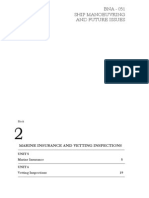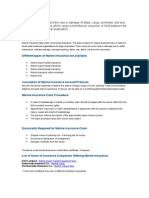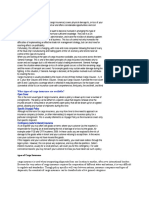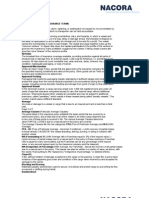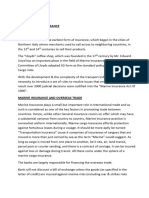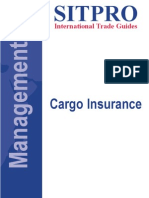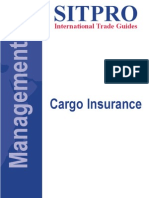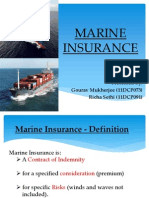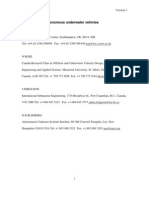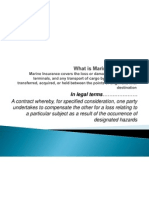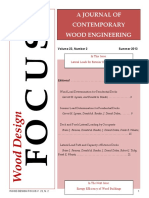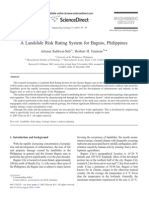0 ratings0% found this document useful (0 votes)
273 viewsStock Throughput Policies
Stock Throughput Policies
Uploaded by
rajasekharbo- The document discusses stock throughput policies, which provide "cradle to grave" insurance coverage for goods from the time the insured assumes interest until their interest ceases. This includes coverage for goods in transit, storage, processing, and at retail locations worldwide.
- It outlines the history of marine cargo insurance and how policies have evolved over time to expand coverage to include more phases of goods handling and additional perils like flood, earthquake, and wind.
- The document examines key aspects of throughput policies from the perspectives of underwriters and brokers, such as understanding the risks, exposures, policy details, and how to address potential issues.
Copyright:
© All Rights Reserved
Available Formats
Download as PDF, TXT or read online from Scribd
Stock Throughput Policies
Stock Throughput Policies
Uploaded by
rajasekharbo0 ratings0% found this document useful (0 votes)
273 views39 pages- The document discusses stock throughput policies, which provide "cradle to grave" insurance coverage for goods from the time the insured assumes interest until their interest ceases. This includes coverage for goods in transit, storage, processing, and at retail locations worldwide.
- It outlines the history of marine cargo insurance and how policies have evolved over time to expand coverage to include more phases of goods handling and additional perils like flood, earthquake, and wind.
- The document examines key aspects of throughput policies from the perspectives of underwriters and brokers, such as understanding the risks, exposures, policy details, and how to address potential issues.
Original Description:
Marine Insurance
Original Title
3. Stock Throughput Policies
Copyright
© © All Rights Reserved
Available Formats
PDF, TXT or read online from Scribd
Share this document
Did you find this document useful?
Is this content inappropriate?
- The document discusses stock throughput policies, which provide "cradle to grave" insurance coverage for goods from the time the insured assumes interest until their interest ceases. This includes coverage for goods in transit, storage, processing, and at retail locations worldwide.
- It outlines the history of marine cargo insurance and how policies have evolved over time to expand coverage to include more phases of goods handling and additional perils like flood, earthquake, and wind.
- The document examines key aspects of throughput policies from the perspectives of underwriters and brokers, such as understanding the risks, exposures, policy details, and how to address potential issues.
Copyright:
© All Rights Reserved
Available Formats
Download as PDF, TXT or read online from Scribd
Download as pdf or txt
0 ratings0% found this document useful (0 votes)
273 views39 pagesStock Throughput Policies
Stock Throughput Policies
Uploaded by
rajasekharbo- The document discusses stock throughput policies, which provide "cradle to grave" insurance coverage for goods from the time the insured assumes interest until their interest ceases. This includes coverage for goods in transit, storage, processing, and at retail locations worldwide.
- It outlines the history of marine cargo insurance and how policies have evolved over time to expand coverage to include more phases of goods handling and additional perils like flood, earthquake, and wind.
- The document examines key aspects of throughput policies from the perspectives of underwriters and brokers, such as understanding the risks, exposures, policy details, and how to address potential issues.
Copyright:
© All Rights Reserved
Available Formats
Download as PDF, TXT or read online from Scribd
Download as pdf or txt
You are on page 1of 39
Stock Throughput Policies
How to make them work for you
Virginia Cameron
Joe Sheridan
September, 2013
Marine Stock Throughput Policy
The Best Kept Secret in Property Insurance
http://link.delvenetworks.com/media/?mediaId=7c1862
fb2cda42a1a5a1bbe06fc468c4&width=382&height=230
&playerForm=LVPPlayer
Bob Bartsch
Underwriters and Brokers
Perspective
Brokers:
No Gap in Coverage
One stop shopping
Competitive Terms and Rates
Underwriters
Increased Premium Potential in Marine Market
Ease of doing business
Complex submissions with CAT modeling, incidental
exposures, and extremely broad coverage
History
Marine cargo insurance is one of the worlds oldest forms of
insurance. The Babylonians developed a system (Code of
Hammurabi, c. 1750 BC),practiced by early Mediterranean sailing
merchants. If a merchant received a loan to fund his shipment,
he would pay the lender an additional sum in exchange for the
lender's guarantee to cancel the loan should the shipment be
stolen.
A thousand years later, the inhabitants of Rhodes created the
'general average', which allowed groups of merchants to pay to
insure their goods being shipped together. The collected
premiums would be used to reimburse any merchant whose
goods were jettisoned during transport, whether to storm or
sinkage.
What Does Cargo Insurance Cover?
The goods insured wording from a sample Cargo Policy Form is:
Goods and/or merchandise and/or property of every description
incidental to The Assureds business consisting principally of, but
not limited to TBA and including prepaid freight and/or advanced
freight and/or guaranteed freight "vessel lost or not lost" (Under
and/or On Deck) shipped by or to the Assured or by or to others
for The Assured's account or control or in which The Assured may
have an interest; also to cover shipments of goods and/or
merchandise and/or property for the account of others on which
The Assured agrees or receives instructions to insure.
The KEY word in this clause is shipped.
Evolution of Marine Insurance
Marine Cargo insurance has been evolving for centuries. During World War II War
Policies added to Marine Cargo Programs.
The Marine extension clause is added:
Goods are now covered during delay, deviation, forced discharge beyond the control
of the assured.
Next evolution Inland Transits are added
Next evolution Goods in storage
Next evolution Goods in Retail locations
Next evolution DSU/ BI/CBI
Thus all the components of a throughput program
Definition of Stock Throughput
There are various definitions of what is included in a throughput program.
The broadest would be:
The Marine Stock Throughput Insurance Program is an all-inclusive Policy
covering goods from the time an Assured assumes an interest in the goods
until their interest ceases.
This insurance hereunder attaches from the time the subject matter becomes at
the Assureds risk or the Assured assumes interest and continues while the
subject matter is in Transit and / or in Store, on Exhibition or elsewhere,
including while held as Stock and / or at the Assureds Stores and / or Outlets
and / or in Consolidation / Deconsolidation Points and / or Processing.
Assembly, Renovation and Repair whether or not in the due course of transit.
Cradle to Grave Coverage: This would include ocean transits (air or vessel),
inland transits, at processors, at warehousing, at exhibitions or trade shows, and
at
retail locations.
Understanding The Details
The Underwriters Perspective
Understanding the Risk
Understanding the Coverage and Coverage Extensions
Understanding the Exposure
Limits and Excess Coverage
Understanding CAT Exposures
Flood
Wind
Quake
Understanding the Risk
What is a Stock Throughput?
Goods in Transit
Goods in Storage or Processing
Retail Locations
One composite rate against sales/ or a combined
approach with flat storage premium
Plus more
Understanding the Risk
What Property is covered in a Stock Throughput?
Raw Goods and Finished Goods
Goods in Process/Processing
Goods of All Kind
Personal Property
Building Coverage ??
Business Interruption/ Contingent BI
Salesmans Samples
Exhibition
Newly Acquired Locations
Understanding the Risk
Where is Property covered in a Stock Throughput?
Worldwide coverage
Insureds own location
Retail locations
Warehouse ,Processing locations and DCs
Exhibitions
Unnamed locations
Third Party Locations
Location Coverage
Warehouse/Processing/ Retail/ Distribution Center
Scheduled or Blanket Limits
Owned locations or Third Party Locations
Are the limits requested equal to the large deductible
under the property program.
Are you charging an adequate premium against the full
values exposed?
Unnamed Warehouse Locations
What is included in Unnamed Locations?
Is it limited to a public warehouse or something else?
Someones garage
The basement
Cave Storage
Unanticipated countries (not on the schedule)
Full CAT cover in unnamed locations?
Are limits extremely high to cover newly acquired
locations?
How are you charging? How many locations do they
have with what values at risk?
Cradle to Grave
Where / When does coverage attach?
On a tree?
In a mine?
In the sea?
International Coverages
Is a local policy required in any of the countries
Does the local country allow inventory to be covered
under a cargo policy?
Are all countries/entities in compliance with OFAC or
other regulations
Do you have proper wording in your policy to prevent
an OFAC violation
Understanding the Coverage
Extensions
Overland Transit (Foreign and Domestic)
Business Interruption/ Contingent Business
Interruption
Delay in Start Up (DSU)
Real Property
Profit Sharing/ No Claims Bonus
Continuity Credits
Guaranteed Rates or Premium
Understanding the Exposures
100% of the Exposure/ Coinsurance
Primary Layer
Excess Layer
Valuation
Did you offer an increased valuation to cover BI?
CAT Perils
Annual Aggregates
Sublimits per Occurrence or Aggregate
Perils Insured Separately
Excess Stock Coverage
Any transit exposure or is this an inventory only
coverage?
Is this primarily a CAT cover? What are your perils?
Is the underlying coverage a cargo policy, or are you
excess of a property policy in some of the foreign
countries?
Excess can be placed in the property market
Will your excess cover drop down if the primary
coverage excludes the peril or has exhausted its limits?
Understanding the CAT Exposures
Flood
What are the flood zones
Windstorm
Coastal
Tornado Alley
Earthquake
Earthquake Zones, Regions or Countries
Tsunamis and others
Modeling What are the issues
Flood
Every location is in a Flood Zone.
Flood Zone A, sometimes called the 100 year flood
zone, means the chance of a flood is 1% or greater. You
can have more than one flood loss every 100 years.
Earthquake
The National Earthquake Information Center (NEIC)
records an average of 20,000 earthquakes every year
(about 50 a day) around the world. There are, however,
millions of earthquakes estimated to occur every year
that are too weak to be recorded
EQSL Incl in Aggs
Fire Following -
Covered
Not in part of agg
Windstorm
Wind includes
Hurricanes
Tornados
Typhoons
Sharknados
Named Windstorm
Is this defined?
Benefits of a Throughput
A single all-inclusive worldwide policy covering goods, whether
finished or otherwise in transit or otherwise on an All Risk basis.
Coverage for goods in Storage / Detention /Processing without
time limitations.
Policy Rate against Sales. This is a Non Reporting Policy.
Low Deductibles on goods in Storage /Detention, including
California.
Limits of liability for Storage / Inventory in excess of $100 million
per location available, including California.
Coverage inclusive of Windstorm, Flood, and Quake
Competitive Rating
Goods are insured against Selling Price
Local Fronting Policies available if/when required
Issues with Throughputs
Issue
Removing the stock from a property policy means that separate deductibles will apply the
stock and the property.
Solution
In the vast majority of cases deductibles under a Stock Throughput policy are considerably
lower than those under a Property policy. This is particularly true of catastrophe
deductibles.
Additionally we have utilized joint deductible wording.
The Company (Insurer or Underwriter) acknowledges that there is other insurance in
force for the Insured that contains a deductible provision. Such insurance is for property
of a type not insured by this policy. In each case of loss or damage deemed a single
occurrence and involving such other insurance and this policy, the amount of the
deductible applicable to this policy shall not exceed the proportion that the loss, damage
or expense insured hereunder bears to the total amount of loss, damage or expense insured
by both this policy and such other insurance combined, without regard to the deductibles
applicable separately under each policy.
Both underwriters must agree to this clause.
Issues with Throughputs
Issue
As marine cargo policies respond only to physical damage, we could have an event
that doesnt damage our inventory yet we could have no access to it. An example
would be an earthquake that makes Ingress / Egress difficult.
Solution
Access to Property Clause
It is understood and agreed that should any governmental or civil authority
deny the Insured access to subject-matter insured hereunder, as a result of
damage to a building and/or structure and/or conveyance in which it is held
from a peril insured against hereunder, such subject matter insured which
cannot be retrieved shall be considered a total loss under the terms of this
insurance contract.
Any salvage from subject matter insured as described above shall be for the
benefit of the Insurers.
Issues with Throughputs
Issue
Throughput policies do not cover business interruption claim following a stock loss.
Solution
All transits and stock can be insured for a Selling Price valuation under the Stock
Throughput Policy. This accommodates any loss of profit in respect of goods in the
current supply chain. This will cover the first turn of any Warehouses.
There will be increased costs incurred in obtaining alternative warehousing and these
costs can be covered by means of an Extra Expenses clause.
Drop Shipments are an alternative solution for distributors
There have been some policies where the valuation is increased for a specified peril in order
to address extended Business Interruption losses after a catastrophic event
Discussion At owned locations, covered under a property policy, it is hard to imagine
a stock loss that would not affect the real property and thus trigger BI. Examples could
be hazardous cargoes or chemicals.
Issues with Throughputs
Issue
For retail throughputs there currently is no anchor or lead
store coverage.
This is correct. There is no coverage for this type of
financial loss in the throughput market.
Would the peril causing the loss at the anchor store affect
our location? If so physical damage and first turn caused
by the damage would be covered.
Sample Risks
Goods of All Kind and Every Description
Chain of grocery stores with $5 Billion in Sales, what are
you really insuring?
Goods in transit
Good in storage
Goods at the retail locations
Are you including business personal property such as
cash registers and displays
Other chains owned by the parent
Are you insuring something other than groceries?
What incidental exposure is included
with the Grocery Store?
Jewelry stores
Did you realize what jewelry exposure you offered?
Exposure is only 6%
Jewelry DC has $60 Million limit
Would you write a jewelry account with $300 Million in
Exposure?
Surveys? Alarm details?
Gas stations as part of the rewards program
Did you know you were insuring gasoline as part of
the Goods of Every Kind
STP Case Study
Throughput Program Traditional Program
Inventory Premium $50,000 $120,742
Cargo Premium $154,500 $170,000
Total Cost $204,500 $290,742
Savings 30% --
Deductible $25,000 $100,000
EQ Deductible, Zone 1 $50,000 5% maximum of $1,063,000
Flood Deductible (100 yr plain) $50,000 1% minimum of $250,000
Sublimit EQ Zone 1 NONE $5,000,000
The Exposures
Have you contemplated all of the incidental
exposures?
Do you understand the unnamed location exposure
and limit?
Coverage Extensions
Understand the extensions requested or included in
the Broker forms
Are you covering Sales Price or some other valuation?
Did you increase the advance to offer some form of BI
protection?
Are you rating against the values exposed?
CAT Perils
Did you identify your CAT exposures
Exclusions
Sublimits
Annual Aggregates
Deductibles
Reinsurance
Rate
Rate Adequacy
If Marine Underwriters are going to profitably
underwrite property risks, they need to be
property underwriters.
Evaluate COPE
What would a property underwriter charge?
Evaluate entire exposure, not just limit provided
Can you justify your rate?
Rate Adequacy
Did you calculate the rate on sales based on expected
exposures?
Warehouse exposures go down when sales go up
Warehouse exposures go up when sales go down (the
inventory is not moving and builds up in the warehouse)
Are shipments less than, equal to, or greater than total
sales?
Do you have a guaranteed premium on renewal
If exposures double, you have just guaranteed a 50% rate
reduction was that your intent?
STP Candidates
Stock Throughput candidates are Manufacturers, Retailers and
Distributors, however any type of business can utilize a Stock
Throughput.
These programs may or may not be the best answer for your client.
Consider:
Does the client own or lease distribution centers?
Are the leases triple net?
Are they insuring furniture and fixtures do they need to?
Do they utilize public warehouses?
How many times do they turn inventory at DCs throughout the year.
Questions
You might also like
- Earthquake Design Criteria For Subways - KueselDocument10 pagesEarthquake Design Criteria For Subways - KueselAA_BB_HHNo ratings yet
- Marine Cargo Insurance ThesisDocument6 pagesMarine Cargo Insurance Thesisnibaditapalmerpaterson100% (2)
- IL PresentationDocument13 pagesIL Presentationlaxman shuklaNo ratings yet
- International Sourcing & Procurement Logistics Assignment.Document13 pagesInternational Sourcing & Procurement Logistics Assignment.Goparapu KiranNo ratings yet
- Why Do I Need Marine Insurance?Document15 pagesWhy Do I Need Marine Insurance?disha_2009No ratings yet
- IMU Marine Insurance and Vetting InspectionsDocument31 pagesIMU Marine Insurance and Vetting Inspectionszaheerbc100% (2)
- Marine PolicyDocument16 pagesMarine Policycuty_phorum2160No ratings yet
- Marine Insurance PHD ThesisDocument6 pagesMarine Insurance PHD Thesisiinlutvff100% (2)
- Glossary of Ocean Cargo Insurance TermsDocument57 pagesGlossary of Ocean Cargo Insurance TermsDimitrios PhilippopoulosNo ratings yet
- What Is Cargo InsuranceDocument2 pagesWhat Is Cargo InsuranceSumith PawarNo ratings yet
- Risk Management & Marine Insurance: BY: Gaurav Tendulkar Mbals018012 Nishidha Bhalla Mbals018013Document17 pagesRisk Management & Marine Insurance: BY: Gaurav Tendulkar Mbals018012 Nishidha Bhalla Mbals018013Hamza MasalawalaNo ratings yet
- Marine Cargo Insurance PolicyDocument6 pagesMarine Cargo Insurance PolicyAnurag GuptaNo ratings yet
- Glossary of Marine Insurance TermsDocument4 pagesGlossary of Marine Insurance Termspens13No ratings yet
- Marine Cargo Insurance - Mr. Udeni Kiridena (Tutorial)Document9 pagesMarine Cargo Insurance - Mr. Udeni Kiridena (Tutorial)vimesh077No ratings yet
- Marine Insurance PolicyDocument7 pagesMarine Insurance Policymano nandhiniNo ratings yet
- Marine Insurance Dissertation TopicDocument6 pagesMarine Insurance Dissertation TopicNeedSomeoneToWriteMyPaperForMeBillings100% (1)
- Cargo InsuranceDocument7 pagesCargo InsuranceshirdawaNo ratings yet
- What Happens When Insurance Totals Your BoatDocument5 pagesWhat Happens When Insurance Totals Your BoatcharlesNo ratings yet
- Semester MaritimeDocument7 pagesSemester Maritimesujith8379No ratings yet
- Cargo Insurance: International Trade GuidesDocument6 pagesCargo Insurance: International Trade GuidesstarysairaaNo ratings yet
- S - What Is Marine InsuranceDocument5 pagesS - What Is Marine InsuranceJahidur RahmanNo ratings yet
- Marine Insurance Dissertation TopicsDocument4 pagesMarine Insurance Dissertation TopicsHelpWithWritingPaperSiouxFalls100% (1)
- Cargo InsuranceDocument55 pagesCargo InsuranceBharat dhusiya100% (1)
- Marine InsuranceDocument14 pagesMarine InsuranceConsiko leeNo ratings yet
- Cargo Insurance: International Trade GuidesDocument6 pagesCargo Insurance: International Trade GuidesnimitpunyaniNo ratings yet
- Cargo InsuranceDocument4 pagesCargo Insurancejoansada23No ratings yet
- Chapter 7 - InsuranceDocument29 pagesChapter 7 - InsuranceDe GawanNo ratings yet
- Non Life Insurance PoliciesDocument8 pagesNon Life Insurance PoliciesAmanuel AbebawNo ratings yet
- Marine InsuranceDocument6 pagesMarine InsuranceJayant RanaNo ratings yet
- Marine InsuranceDocument30 pagesMarine Insurancesreekala spNo ratings yet
- Insurance and TypesDocument4 pagesInsurance and TypesRaghavendra BarikNo ratings yet
- Diction InsuranceDocument7 pagesDiction InsurancesinthustonNo ratings yet
- Cargo InsuranceDocument55 pagesCargo InsuranceBharat dhusiyaNo ratings yet
- Marine Policy in India and TypesDocument16 pagesMarine Policy in India and TypesMiraRaiNo ratings yet
- Chapter 6Document9 pagesChapter 6ibrahim JimaleNo ratings yet
- ILaw Marine InsuranceDocument31 pagesILaw Marine InsurancesuleymanNo ratings yet
- Time PolicyDocument5 pagesTime PolicyOliviaDuchessNo ratings yet
- Marine InsuranceDocument4 pagesMarine InsuranceChandraprabha AnnajiraoNo ratings yet
- Marine InsuranceDocument18 pagesMarine InsuranceDitto SabuNo ratings yet
- Mahmuda MemDocument3 pagesMahmuda MemDurer KashbonNo ratings yet
- Cargo OL (Group 3)Document4 pagesCargo OL (Group 3)maulana anjasmaraNo ratings yet
- Export International Trade Transport Risk PDFDocument2 pagesExport International Trade Transport Risk PDFhmsonawaneNo ratings yet
- M4.5.1 Marine Insurance TypesDocument6 pagesM4.5.1 Marine Insurance TypesDhruvin ManekNo ratings yet
- Marine InsuranceDocument43 pagesMarine InsuranceGourav Mukherjee100% (4)
- Tata Aig Marine BrochureDocument8 pagesTata Aig Marine Brochurechaitanyabarge100% (2)
- UT Griffiths Insurance SubmittedDocument19 pagesUT Griffiths Insurance SubmittedpostscriptNo ratings yet
- TSC Marine UpdateDocument32 pagesTSC Marine UpdateVikas SinghNo ratings yet
- Cargo Risks: When To EnsureDocument8 pagesCargo Risks: When To EnsureAyush KumarNo ratings yet
- Marine Insurance NotesDocument44 pagesMarine Insurance NotesAye Aye MyintNo ratings yet
- InsuranceDocument22 pagesInsuranceMeet BuchNo ratings yet
- Marine Insurace For International Trade LawDocument43 pagesMarine Insurace For International Trade LawOnik RahamanNo ratings yet
- Who Effects Marine Insurance: Seller BuyerDocument32 pagesWho Effects Marine Insurance: Seller BuyerIdrisNo ratings yet
- Dissertation Marine InsuranceDocument5 pagesDissertation Marine InsurancePaySomeoneToDoMyPaperCanada100% (1)
- Cargo Insurance Unit 6Document43 pagesCargo Insurance Unit 6Shikha Gupta100% (1)
- Marine InsuranceDocument5 pagesMarine InsuranceHimangshuNo ratings yet
- Marine InsuranceDocument10 pagesMarine InsuranceTanvir HossainNo ratings yet
- 18bco32c U5Document10 pages18bco32c U5PawanNo ratings yet
- Marine InsuranceDocument33 pagesMarine InsuranceSitiNo ratings yet
- International Transit Insurance Final 20190930Document21 pagesInternational Transit Insurance Final 20190930ASMANo ratings yet
- The Function of Protection & Indemnity Marine Insurance in Relation to Ship Owner´S Liability for Cargo Claims: Framing the Legal ContextFrom EverandThe Function of Protection & Indemnity Marine Insurance in Relation to Ship Owner´S Liability for Cargo Claims: Framing the Legal ContextNo ratings yet
- How Does Core Analysis WorkDocument4 pagesHow Does Core Analysis WorkrajasekharboNo ratings yet
- Where Is Heavy Oil FoundDocument1 pageWhere Is Heavy Oil FoundrajasekharboNo ratings yet
- How Does Gas Injection WorkDocument3 pagesHow Does Gas Injection WorkrajasekharboNo ratings yet
- How Does Pipeline Pigging WorkDocument3 pagesHow Does Pipeline Pigging WorkrajasekharboNo ratings yet
- How Is Heavy Oil ProducedDocument2 pagesHow Is Heavy Oil ProducedrajasekharboNo ratings yet
- What Is EOR, and How Does It Work?: Thermal RecoveryDocument4 pagesWhat Is EOR, and How Does It Work?: Thermal RecoveryrajasekharboNo ratings yet
- How Is Nitrogen Used in Oil and Gas FieldsDocument4 pagesHow Is Nitrogen Used in Oil and Gas FieldsrajasekharboNo ratings yet
- How Do US Natural Gas Pipelines Move Gas To MarketsDocument3 pagesHow Do US Natural Gas Pipelines Move Gas To MarketsrajasekharboNo ratings yet
- How Does Subsea Processing WorkDocument4 pagesHow Does Subsea Processing WorkrajasekharboNo ratings yet
- How Do Subsea Trees WorkDocument2 pagesHow Do Subsea Trees WorkrajasekharboNo ratings yet
- How Do Umbilicals WorkDocument2 pagesHow Do Umbilicals WorkrajasekharboNo ratings yet
- How Does Directional Drilling WorkDocument2 pagesHow Does Directional Drilling WorkrajasekharboNo ratings yet
- How Are HP/HT Reservoirs Developed?Document3 pagesHow Are HP/HT Reservoirs Developed?rajasekharboNo ratings yet
- How Does Well Control WorkDocument3 pagesHow Does Well Control WorkrajasekharboNo ratings yet
- How Does Blowout Control WorkDocument3 pagesHow Does Blowout Control WorkrajasekharboNo ratings yet
- How Does A Top Drive Work?: Top Drivesource: Aker SolutionsDocument2 pagesHow Does A Top Drive Work?: Top Drivesource: Aker SolutionsrajasekharboNo ratings yet
- How Does A Drillship WorkDocument2 pagesHow Does A Drillship WorkrajasekharboNo ratings yet
- Regression WorksheetDocument2 pagesRegression WorksheetRocket FireNo ratings yet
- S8 - Q2 - Week 1Document11 pagesS8 - Q2 - Week 1Dabe Genesis Ligalig100% (1)
- 110上高中英文 (一) VIP自學寶典-L1 學用 (110f354576)Document22 pages110上高中英文 (一) VIP自學寶典-L1 學用 (110f354576)黃紘志No ratings yet
- UBC97 Seismic Design Presentation (v2)Document55 pagesUBC97 Seismic Design Presentation (v2)Muhammed RafeekNo ratings yet
- 4.5 - Earthquake HazardsDocument26 pages4.5 - Earthquake HazardsJboy MnlNo ratings yet
- National Seismology Centre NoidaDocument11 pagesNational Seismology Centre NoidaanuNo ratings yet
- prEN1998-3 St34 Jan03 N343 PDFDocument76 pagesprEN1998-3 St34 Jan03 N343 PDFAlexa AlexandruNo ratings yet
- 3D Geological Modeling of Punjab Platform, Middle Indus BasinDocument7 pages3D Geological Modeling of Punjab Platform, Middle Indus BasinJonathan RobertsNo ratings yet
- Shear Force and Bending Moment in Beams and FramesDocument25 pagesShear Force and Bending Moment in Beams and Framesnaveenpnaidu1No ratings yet
- Ahmed Kazi SiamDocument72 pagesAhmed Kazi Siamzahid881No ratings yet
- Solution To Picnic at Hanging RockDocument9 pagesSolution To Picnic at Hanging RockAlfonsoGuitarra50% (2)
- Current Issues Earthquakes in MindanaoDocument2 pagesCurrent Issues Earthquakes in MindanaoJohnaisa KaharNo ratings yet
- Geotechnical Earthquake Engineering: Dr. Deepankar ChoudhuryDocument58 pagesGeotechnical Earthquake Engineering: Dr. Deepankar ChoudhuryNarayan RoyNo ratings yet
- Geosciences 13 00319 - 2Document17 pagesGeosciences 13 00319 - 2davoNo ratings yet
- A Journal of Contemporaru Wood EngineeringDocument30 pagesA Journal of Contemporaru Wood EngineeringJose Martinez De MedinaNo ratings yet
- Fema Hazus 5.1 Earthquake Model User GuidanceDocument238 pagesFema Hazus 5.1 Earthquake Model User GuidancekhuNo ratings yet
- Theory of Seismic Imaging PDFDocument226 pagesTheory of Seismic Imaging PDFAngel Saldaña100% (1)
- A Landslide Risk Rating System For Baguio PhilippinesDocument15 pagesA Landslide Risk Rating System For Baguio Philippinesmark_zarcoNo ratings yet
- Trabalho de InGles WordDocument1 pageTrabalho de InGles WordDiogo RamalhoNo ratings yet
- Director Seismic StudiesDocument3 pagesDirector Seismic StudieskazimmehdiNo ratings yet
- BookSample PDFDocument106 pagesBookSample PDFPacha Khan KhogyaniNo ratings yet
- Updates On Chapter 2: Minimum Design Loads: National Structural Code of The Philippines NSCP 2015, Volume 1Document52 pagesUpdates On Chapter 2: Minimum Design Loads: National Structural Code of The Philippines NSCP 2015, Volume 1Oreo CreamNo ratings yet
- Design of Intz TankDocument14 pagesDesign of Intz TankSubbaReddyNo ratings yet
- Speech ChoirDocument2 pagesSpeech Choiranon_746460944No ratings yet
- Swinburne University of Technology, Australia: Geotechnical Instrumentation Used During Dam ConstructionDocument5 pagesSwinburne University of Technology, Australia: Geotechnical Instrumentation Used During Dam ConstructionShehan FernandoNo ratings yet
- Earthquakes and FaultsDocument52 pagesEarthquakes and FaultsCecilia SaritaNo ratings yet
- FEMA P695 Final Report PDFDocument155 pagesFEMA P695 Final Report PDFÖzgür BozdağNo ratings yet
- Bridge Design - Loads4Document42 pagesBridge Design - Loads4Juan FernandezNo ratings yet
- MODULE 2.docx by MitchDocument6 pagesMODULE 2.docx by MitchRodel CamposoNo ratings yet





